Product management solution plays a critical role in helping teams plan, prioritize, and effectively execute their product development. You could be a product manager, developer, designer, marketer, or founder of a startup – using the right tool ensures that teamwork happens effortlessly, decisions are better made, and time-to-market is reduced.
The best product management tools should have roadmapping, backlog management, automated work, and smooth integrations with other tools. Our selection criteria include usability, scalability, collaboration capabilities, cost, security, and support.
This list of the top 15 product management software is meant to shortlist the best options available in the market to help teams stay well-structured, improve workflows, and build successful products within today’s competitive market.
Criteria for Selecting the Best Product Management Software
Choosing the best product management system requires taking many factors into consideration when choosing software suitable for your processes and team requirements.
- Functions: A set of features with road mapping, prioritization, feedback management, and automation should be included.
- User-friendly: The program must also have an intuitive interface and require little training.
- Collaboration: Good collaboration tools are necessary in order to be able to have smooth communication across teams and tasks.
- Adaptability: Scalability guarantees the software is able to manage increasing teams and intricate projects.
- Affordability: Pricing must be reasonable, providing a quality-for-money experience.
- Safety: Security aspects such as data encryption and regulatory compliance are essential.
- Support: Friendly customer support and frequent updates are the icing on the cake.
List of Top 15 Product Management Software
1. Jira Product Discovery
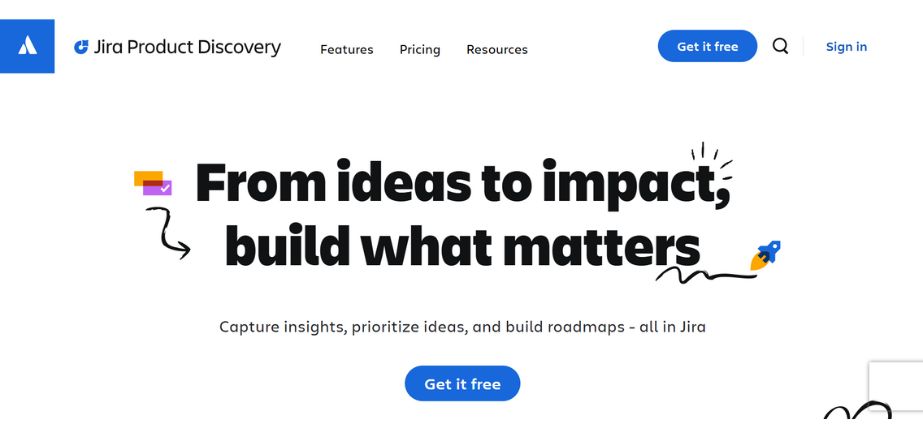
Jira Product Discovery is an idea and roadmapping platform designed for product managers. It assists teams in generating insights, making priorities, and collaborating efficiently. It has a continuous workflow from ideation to delivery and is Jira-friendly.
Customizable prioritization templates, collaborating with stakeholders, and tracking ideas are the chief features. Product strategies can be made to relate to engineering activity by the teams, which improves the decision-making process.
With real-time feedback and visual roadmaps, Jira Product Discovery maximizes transparency across teams. Suitable for agile teams and companies using Jira, the software simplifies product discovery and backlog management to ensure development activity is synchronized with business goals.
Key Features:
- Idea management and prioritization
- Integration with Jira Software for development tracking
- Customizable roadmaps and insights
- Collaboration tools for cross-functional teams
Pros:
- Seamlessly integrates with Jira for development handoff
- Helps structure ideas with customer feedback
Cons:
- It can be complex for beginners
- Limited standalone use without Jira Software
Price: $10 /user/per month for paid plans, free for small teams.
Who Should Use It?
Product managers are already using Jira for software development.
2. Productboard
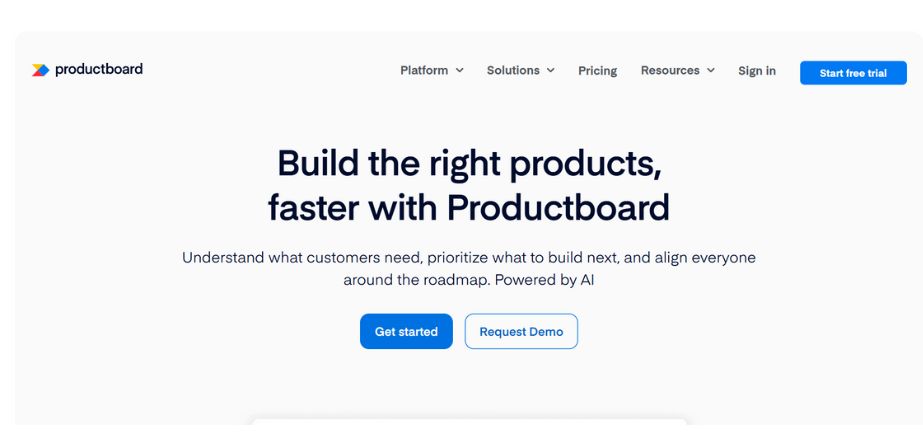
Productboard is user-focused and one of the best product management software tools that helps teams collect user feedback, prioritize features, and create open roadmaps. It integrates with tools like Jira, Slack, and Trello to maintain seamless collaboration.
Product managers can centralize ideas from different sources, rank them in terms of user impact, and align development activities. Flexible roadmaps, prioritization templates, and AI-powered insights allow teams to make the right decisions.
With its customer segmentation and feedback analysis capabilities, Productboard is most appropriate for user-need-driven businesses. It is used by product teams in startups, mid-sized businesses, and enterprises looking for structured product planning.
Key Features:
- Centralized customer feedback collection
- Feature prioritization based on customer insights
- Roadmap visualization and alignment
- Integration with popular tools like Jira, Slack, and Trello
Pros:
- Customer feedback-driven decision-making
- Strong visualization for product roadmaps
Cons:
- Can be expensive for small teams
- Learning curve for new users
Pricing: Starts at $19/user/month
Who Should Use It?
Product teams prioritized and paid attention to consumer feedback.
3. Aha!
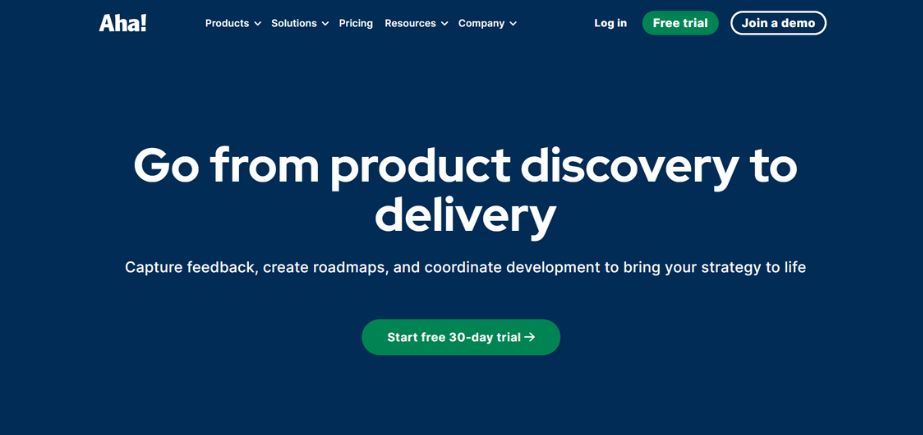
Aha! is an end-to-end product management software designed for planning roadmaps, managing ideas, and tracking goals. It has robust prioritization systems, strategic planning capabilities, and integration with Dev platforms like Jira and Azure DevOps.
Product teams are able to look at timelines, set milestones, and link goals to company strategy. Aha! has templates for roadmap creation, making it easy to customize. Its feedback portal allows customer-driven development, enhancing product-market fit.
Best suited for business and mid-market organizations, Aha is a powerful team platform for those companies that need structured product planning and business objective alignment.
Key Features:
- Goal-based product planning
- Roadmap customization and visualization
- Idea management and prioritization
- Integration with development tools like Jira and Azure DevOps
Pros:
- Highly customizable roadmaps
- Strong strategic planning capabilities
Cons:
- Pricing is on the higher side
- Can feel overwhelming due to feature richness
Pricing: Starts at $59/user/month
Who Should Use It?
Enterprise product teams need extensive customization.
4. Roadmunk
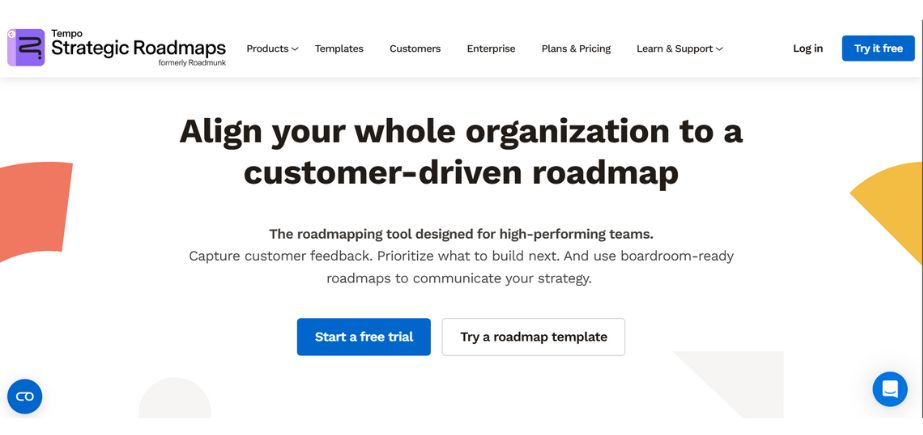
Roadmunk is a road mapping software that enables product teams to develop concise, visual roadmaps. It supports the creation of various views of roadmaps, such as timelines and swimlanes, for different stakeholders.
Product managers can use scoring mechanisms built into the tool to prioritize initiatives and gather customer opinions to inform data-driven decisions. For effective workflows, the program can be integrated with Jira, Azure DevOps, and Trello.
With its powerful visualization feature, Roadmunk is best suited for teams that require effective conveying of product strategy. Roadmunk is most suitable for product leaders, agile teams, and strategic roadmap alignment organizations.
Key Features:
- Multiple roadmap visualization formats
- Customizable prioritization frameworks
- Integration with Jira and other PM tools
- Collaboration features for teams
Pros:
- Easy to create and share roadmaps
- Flexible prioritization methods
Cons:
- No advanced task management features
- Limited integrations compared to competitors
Pricing: Starts at $19/user/month
Who Should Use It?
Teams that need dedicated roadmapping with stakeholder alignment
5. Airfocus
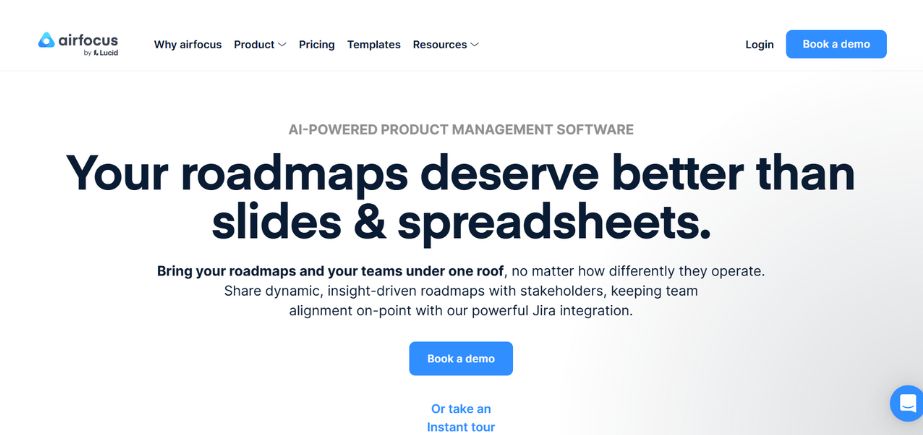
With the help of the adaptable product management platform Airfocus, teams can work together, prioritize products, and create roadmaps. It offers adaptable prioritization frameworks, such as RICE and MoSCoW, which enable teams to concentrate on impactful features.
Airfocus is easily integrated with tools such as Jira, Trello, and Asana. Its AI-driven insights and feedback system enable product teams to make informed decisions in line with customer requirements.
With drag-and-drop roadmaps and customizable workspaces, it maximizes workflow efficiency. Most appropriate for product teams of expanding startups and organizations, Airfocus streamlines intricate decision-making and encourages data-based prioritization.
Key Features:
- Customizable prioritization frameworks
- Drag-and-drop roadmap builder
- AI-powered insights for decision-making
- Integration with Jira, Trello, Asana, and Slack
Pros:
- Strong focus on prioritization
- Easy-to-use UI with flexibility
Cons:
- Limited reporting capabilities
- Advanced features are locked behind higher plans
Pricing: Starts at $59/user/month
Who Should Use It?
Product teams need structured prioritization and decision-making.
6. ClickUp
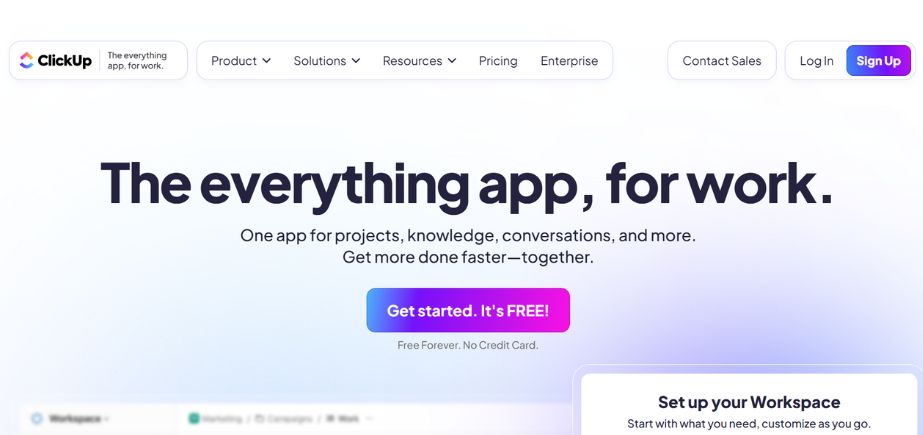
ClickUp is a product and project management platform that allows task tracking, goal setting, and collaboration in one tool. It can design custom workflows, automate tasks, and integrate tools such as Slack, Google Drive, and Jira. ClickUp enables teams to build visual roadmaps, set product feature priorities, and monitor development in real time.
Its flexibility makes ClickUp suitable for product managers to utilize in backlog grooming, sprint planning, and feature tracking. With integrated docs, mind maps, and dashboards, it accommodates both agile and waterfall methodologies. Ideal for startups and enterprises, ClickUp is perfect for teams looking for a highly customizable and scalable product management software.
Key Features:
- Task and roadmap management
- Custom fields and views
- Goal tracking and OKRs
- Integration with 1000+ apps
Pros:
- Extremely flexible and customizable
- Free plan with robust features
Cons:
- Can feel cluttered due to numerous features
- Learning curve for new users
Pricing: Paid plans start at $10 per user each month, but free plans are available.
Who Should Use It?
Teams seeking an all-in-one, extremely adaptable workspace
7. Trello
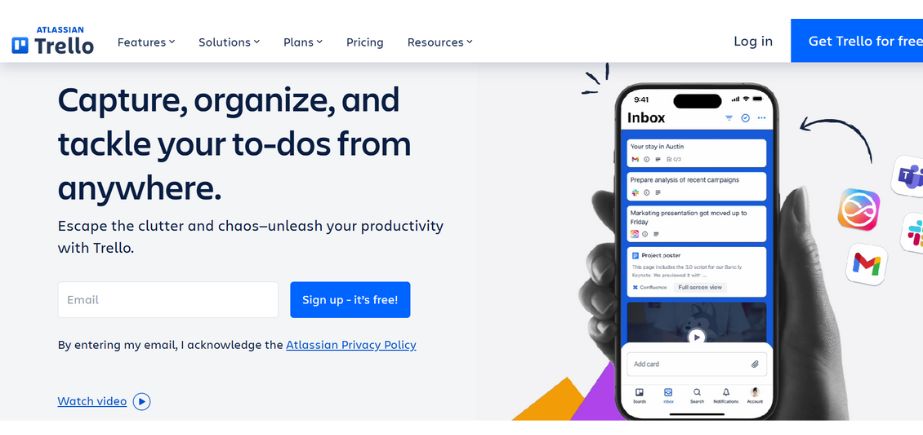
Trello is a visual project management solution that is simple to use and lets teams organize work using cards, lists, and boards. It facilitates product management with flexible workflows, enabling product teams to monitor features, prioritize work, and collaborate.
Trello integrates with applications such as Slack, Google Drive, and Jira, enabling work to be synced across teams easily. Though it is not equipped with sophisticated prioritization tools, it is excellent for agile teams and startups due to its simple drag-and-drop platform.
Trello is ideal for product managers requiring a light system to handle ideas, sprints, and feature backlogs within an easy interface.
Key Features:
- Drag-and-drop Kanban boards
- Customizable workflows
- Power-Ups for integrations
- Collaboration features
Pros:
- Easy to use and visually appealing
- Free plan available
Cons:
- Lacks advanced reporting and analytics
- Can become cluttered for large teams
Pricing: Paid plans start at $5 per user per month, but free plans are available.
Who Should Use It?
Startups and small teams need visual organization.
8. Asana
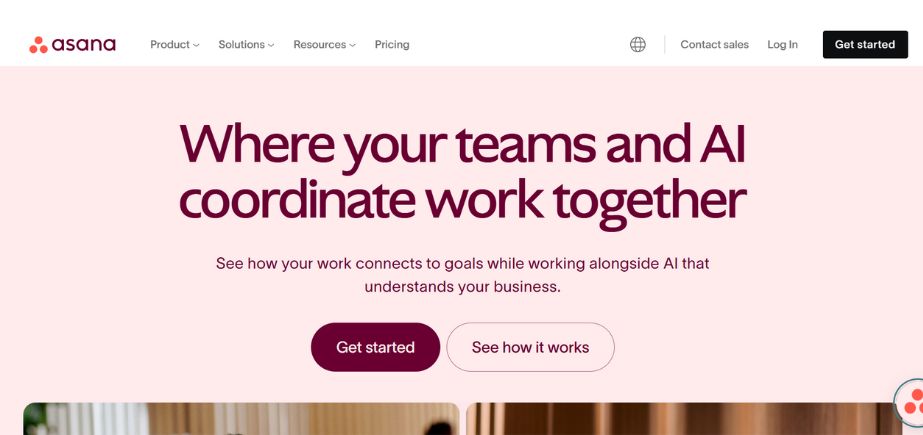
The powerful platform Asana provides teams that build products with robust work management functions to simplify their planning procedures and connect teams through various execution modes.
Asana makes product road mapping and backlog management possible through its tools for setting task dependencies, together with timeline management and goal monitoring functionalities.
Users can synchronize their workflow processes when Asana links to Jira, Slack, and Google Drive through its integrated system. Product managers create dedicated workflows, establish priority settings, and track team progress across different teams.
This tool provides excellent results for organizations of medium size and helps different teams maintain agreement about their goals while executing their product strategies.
Key Features:
- Task dependencies and automation
- Customizable project views (List, Kanban, Calendar)
- Workload and resource management
- Integration with 200+ apps
Pros:
- Intuitive UI and easy adoption
- Strong task management features
Cons:
- No dedicated product roadmap feature
- It can feel overwhelming for beginners
Pricing: Paid plans start at $10.99 per user per month, but free plans are available.
Who Should Use It?
Teams needing structured task and workflow management
9. Monday.com
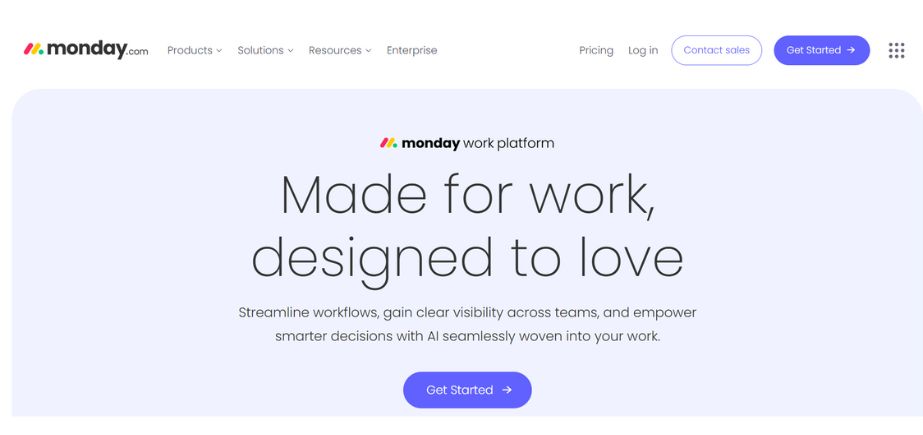
Monday.com is an agile work operating system that enables teams to handle product roadmaps, development tracking, and real-time collaboration. It has automation, customizable templates, and Jira, Trello, and Slack connections.
Product managers can map project timelines, establish feature priorities, and organize workflows using drag-and-drop dashboards. Monday.com’s intuitive platform allows progress to be tracked easily, sprints to be managed, and stakeholder feedback to be captured.
With robust reporting capabilities, it is best suited for agile teams, startups, and businesses looking for a scalable, easy-to-use product management software.
Key Features:
- Custom workflows for product management
- Timeline and Kanban views
- Automation for task assignments
- Team collaboration and file sharing
Pros:
- Highly customizable and visual
- Easy-to-use templates for product teams
Cons:
- Advanced features require paid plans
- Limited reporting in lower-tier plans
Pricing: Starts at $9/user/month
Who Should Use It?
Teams looking for an intuitive, customizable PM tool
10. Notion
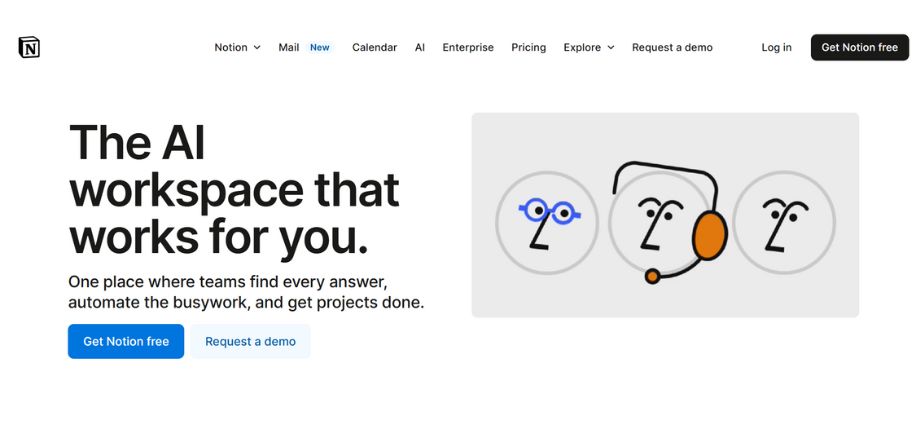
Notion is a one-stop workspace for note-taking, documentation, and product management. It has databases, kanban boards, and roadmaps, and is thus a versatile tool for product teams.
Feature trackers, customer feedback organization, and roadmap planning can be done by users in a shared environment. Notion facilitates workflow coordination by supporting interfaces with Jira, Google Drive, and Slack.
Although it does not have sophisticated prioritization capabilities, its editable templates and extensive documentation functionality make it perfect for early product teams, single product managers, and startups who need a light but flexible tool.
Key Features:
- Custom databases and templates
- Document collaboration
- Roadmap and task management
- Integration with Slack, GitHub, and more
Pros:
- Highly customizable and flexible
- Free plan available
Cons:
- Lacks built-in advanced analytics
- Can become unstructured with complex projects
Pricing: Paid plans start at $10 per user each month, but free plans are available.
Who Should Use It?
Product managers needing an all-in-one documentation + PM tool
11. Craft.io
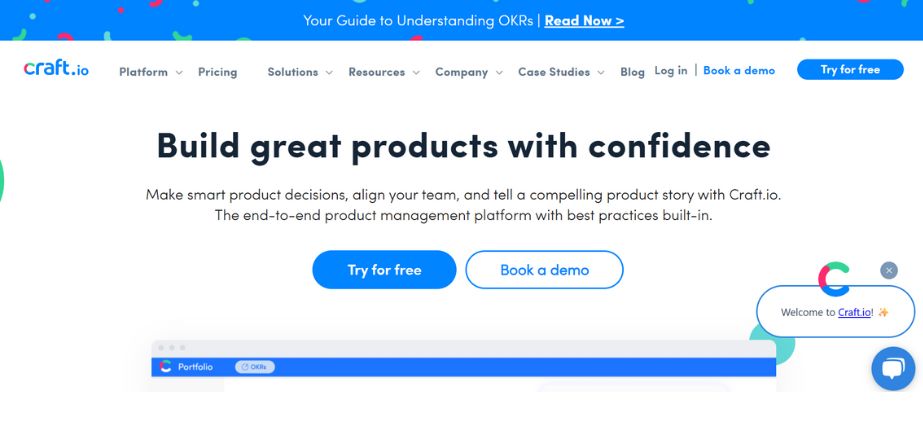
Craft.io is a product management software for planning roadmaps, prioritization, and stakeholder collaboration. It offers built-in prioritization frameworks like RICE and MoSCoW to support data-driven decision-making.
Craft.io also supports integration with Jira, Slack, and Microsoft Teams to enable smooth team communication. Its user story mapping capability, together with feedback collection, helps product managers reconcile product vision and customer requirements.
The ease of use of the tool makes it quite suitable for agile teams, mid-sized businesses, and big companies looking for a product development process with order.
Key Features:
- Built-in prioritization frameworks
- User story mapping
- Roadmapping and backlog management
- Integration with Jira, Slack, and Azure DevOps
Pros:
- Strong feature prioritization capabilities
- Intuitive and well-designed UI
Cons:
- Higher learning curve for new users
- Pricing may be high for smaller teams
Pricing: Starts at $19/user/month
Who Should Use It?
Product managers are looking for a structured, feature-rich tool for prioritization and roadmapping.
12. Wrike
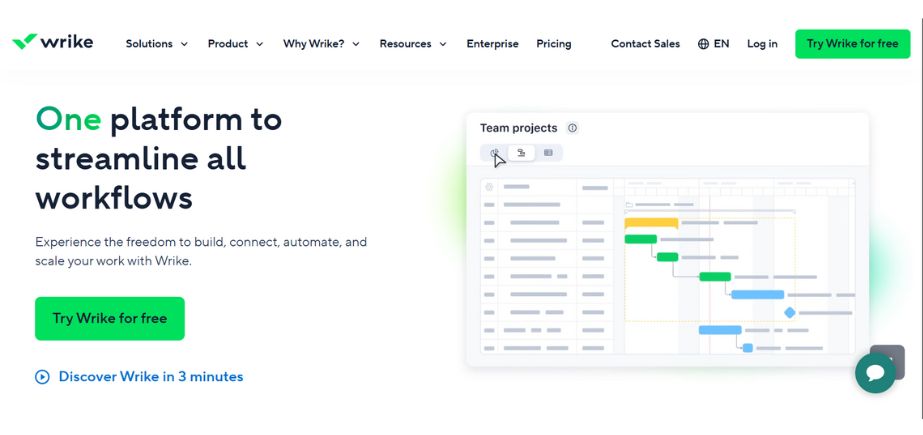
Wrike is a work management platform that tracks the end-to-end product lifecycle. It has customizable workflows, automation, and collaboration capabilities to automate product development.
Wrike’s dynamic request forms enable teams to gather feature requests, and Gantt charts and Kanban boards give project timelines clarity. Cross-team coordination is enabled through integration with Jira, Asana, and Slack.
With sophisticated analytics and reporting, Wrike is ideal for enterprises and teams that handle intricate product roadmaps calling for extensive tracking and resource planning.
Key Features:
- Custom workflows and automation
- Gantt charts and Kanban boards
- Real-time reporting and analytics
- Integration with 400+ apps
Pros:
- Highly customizable for different workflows
- Excellent reporting and analytics features
Cons:
- It can feel complex for new users
- Higher-tier plans are required for advanced features
Pricing: Paid plans start at $10 per user each month, but free plans are available.
Who Should Use It?
Product teams are looking for powerful collaboration and workflow automation.
13. Confluence
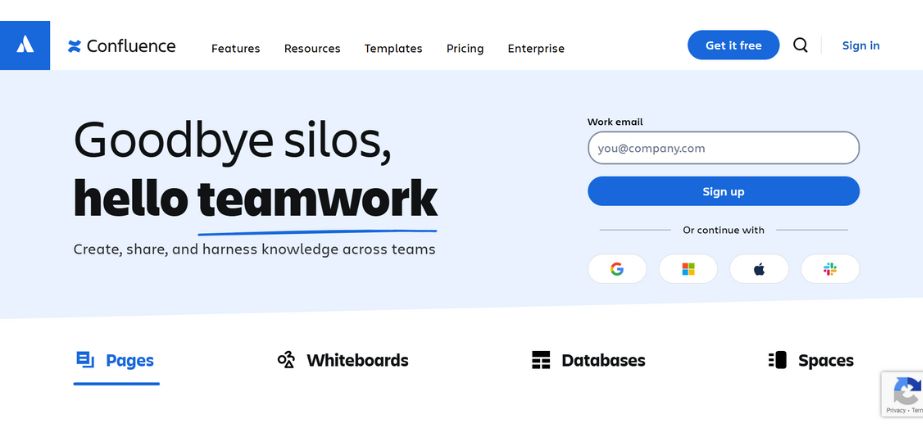
Atlassian’s Confluence is a collaboration and documentation software employed by product teams to plan, document, and roadmap. It connects easily with Jira, enabling quick linking of development work to product documentation. The templates can be customized for use in producing product requirement documents, meeting records, and strategic plans.
The platform allows simultaneous collaboration and version management and ensures that all teams are synchronized. Best suited for businesses and large teams, Confluence is best for product managers who require a centralized location for managing product-related documentation and cross-functional communication.
Key Features:
- Collaborative document editing
- Integration with Jira and Trello
- Templates for roadmaps and planning
- Version control and commenting
Pros:
- Seamless integration with Atlassian products
- Excellent for documentation and collaboration
Cons:
- Not a full-fledged product management software
- Can become cluttered without proper organization
Pricing: Free plan available; paid plans start at $5.16/user/month
Who Should Use It?
Product managers need a structured knowledge management system integrated with Jira.
14. Pivotal Tracker
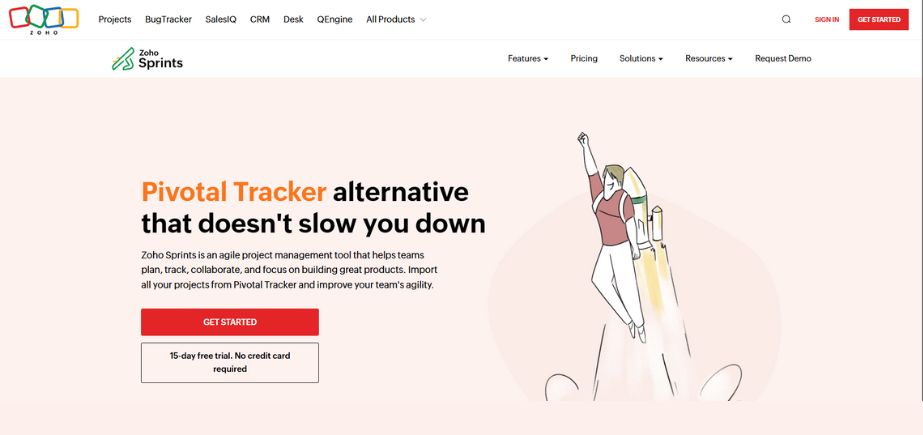
Pivotal Tracker, an agile project management tool, is software intended for use in product development applications. Users can navigate through this platform to handle their backlog requirements alongside sprint planning while observing live progress assessments.
Pivotal Tracker enables teams to organize their feature development through its story-based workflow so they can easily perform efficient work delivery and task prioritization. Through integration with Slack, GitHub, and Jira, it streamlines group work between software developers and product management personnel.
Pivotal Tracker serves as an excellent tool for software development firms as well as agile teams to improve their product planning alignment alongside transparency measures.
Key Features:
- Agile backlog and sprint planning
- Story-based prioritization and tracking
- Real-time collaboration and progress updates
- Integration with GitHub, Slack, and CI/CD tools
Pros:
- Designed specifically for agile teams
- Simple and easy-to-use interface
Cons:
- Limited customization options
- Lacks advanced reporting features
Pricing: Free for up to 5 users; custom pricing available
Who Should Use It?
Iterative product releases and sprints are managed by an agile development team.
15. ProdPad
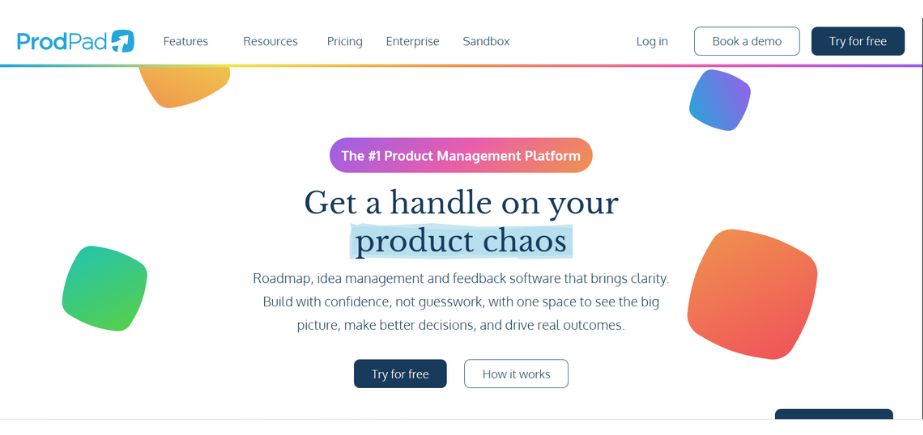
ProdPad is an idea management, roadmap planning, and customer feedback tool for products. It helps teams collect information from different sources, prioritize features through in-built structures, and associate roadmaps with business objectives.
ProdPad offers integration with Jira, Trello, and Slack to ensure the workflow is as easy as pie. AI-backed insights help product managers track trends and make decision-making seamless. Perfect for product leaders, businesses, and startups alike, ProdPad maintains product development customer-focused and strategically aligned.
Key Features:
- Idea backlog and feature prioritization
- Roadmap visualization and alignment
- Feedback collection from customers and teams
- Integration with Jira, Trello, and Slack
Pros:
- Great for early-stage product planning
- Strong customer feedback management
Cons:
- Lacks built-in project management features
- Can be expensive for small teams
Pricing: Starts at $30/user/month
Who Should Use It?
Product teams focus on idea management and early-stage planning.
Comparison Between Best Product Management Software
Here’s a comparison table for the best product management tools, covering key features, pricing, use cases, and official websites.
| Software | Key Features | Pricing | Best For | Website |
| Jira Product Discovery | Roadmapping, backlog management, and integrations with Jira | Free, Paid plans start at $10/user/month | Agile teams, software development companies | Atlassian |
| Productboard | Idea management, prioritization frameworks, and roadmaps | Starts at $19/user/month | Product managers, mid-size to large companies | Productboard |
| Aha! | Strategy roadmaps, idea crowdsourcing, and integrations | Starts at $59/user/month | Enterprises, product strategy teams | Aha! |
| Roadmunk | Visual roadmaps, prioritization, and feedback management | Starts at $19/user/month | Product managers, startups, and roadmap planning | Roadmunk |
| Airfocus | Custom workflows, priority scoring, and roadmap visualization | Starts at $59/user/month | Agile teams, product teams of all sizes | Airfocus |
| ClickUp | Task management, roadmaps, and automation | Free, Paid plans start at $10/user/month | Small teams, startups, and remote teams | ClickUp |
| Trello | Kanban boards, collaboration tools, and task tracking | Free, Paid plans start at $5/user/month | Freelancers, small teams, and simple task tracking | Trello |
| Asana | Task dependencies, goal tracking, and automation | Free, Paid plans start at $10.99/user/month | Mid-sized businesses, agile teams | Asana |
| Monday.com | Workflow automation, customizable dashboards, and integrations | Starts at $9/user/month | Cross-functional teams, large organizations | Monday.com |
| Notion | All-in-one workspace, note-taking, and databases | Free, Paid plans start at $10/user/month | Startups, remote teams, and documentation-heavy workflows | Notion |
| Craft.io | Prioritization frameworks, product roadmaps, and integrations | Starts at $19/user/month | Product managers, mid to large teams | Craft.io |
| Wrike | Gantt charts, collaboration, and reporting | Free, Paid plans start at $10/user/month | Enterprises, project managers, and agile teams | Wrike |
| Confluence | Documentation, collaboration, and integrations with Jira | Free, Paid plans start at $5.16/user/month | Enterprises, software development teams | Confluence |
| Pivotal Tracker | Agile project management, backlog management, and collaboration | Free, custom pricing available | Software development teams, agile teams | Pivotal Tracker |
| ProdPad | Idea management, feedback collection, and roadmaps | Starts at $30/user/month | Startups, product managers, innovation teams | ProdPad |
Conclusion
Selecting the best product management software is based on your team’s requirements, budget, and process. Jira Product Discovery and Pivotal Tracker are best suited for agile software development teams, whereas Productboard and Aha! are suitable for prioritization and road mapping. The greatest platforms for teams that need flexibility and cooperation include Monday.com, ClickUp, and Asana.
Startups and small enterprises can find Trello, Notion, or Instamojo more affordable and user-friendly. Businesses that need sophisticated integrations can opt for Wrike. Choosing the right tools is crucial for product development companies, as the ideal tool fits your workflow, streamlines productivity, and enables the delivery of better products to market more quickly.
FAQs
1. What is product management software?
Product management solution assists teams in planning, building, and delivering products through features that support road mapping, task management, collaboration, and progress tracking.
2. Which product management program is ideal for new businesses?
The best product management software that startups can use is Trello, Notion, and ClickUp because of their affordability, simplicity, and flexibility.
3. Is it possible to link product management tools with other tools?
Yes, all such tools, such as Jira, Aha!, and Monday.com, are integrated with Slack, GitHub, CRM tools, and other project management tools.
4. Is there free product management software?
Yes, there are tools such as Trello, Notion, and ClickUp that provide free plans with limited features.
5. What are the key considerations when selecting the best product management solution?
The most important factors that should be present in the best product management software are features, usability, scalability, cost, integration support, and customer support.

